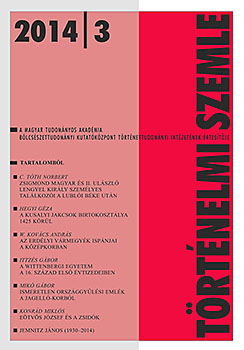Eötvös József és a titkosrendőrség az 1839–1840-es országgyűlésen
József Eötvös and the Secret Police at the Parliament of 1839–1840
Author(s): Orsolya VölgyesiSubject(s): Governance, Political history, Theology and Religion, Security and defense, 19th Century
Published by: Magyar Tudományos Akadémia Bölcsészettudományi Kutatóközpont Történettudományi Intézet
Keywords: József Eötvös; secret police; Parliament; 1839–1840; Hungary;
Summary/Abstract: One of the chief novelties of the Hungarian parliament of 1839–1840 was a marked growth of the role of the upper chamber and a definite increase of its political weight. Alongside the new conservatives, another sizeable opposition group, focused on count Lajos Batthyány, emerged in the upper chamber. The parliamentary secret police showed a keen interest in the activities of the aristocratic opposition from the outset, and paid special attention to the utterances of baron József Eötvös, who attended the diet for the first time. The young baron was already a well-known writer when he appeared at the venue of the parliament late in November 1839; he had been elected as an honorary member of the Academy of Sciences shortly before, on 23 November, and the very next day he held, in the county hall of Pest, a famous, widely resounding speech in the memory of Ferenc Kölcsey, who had died in 1838. Upon his arrival, Eötvös joined the parliamentary debates in matters of religion which had been going on for months. The debates went along basically two lines. On the one hand, the diet took on its agenda the religious grievances and demands which had been suspended during the parliament of 1832–1836 after a half-year discussion, and, on the other hand, a proposition was discussed first at the lower chamber and then on the upper chamber which protested against a procedure followed by bishops Ferenc Lajcsák of Nagyvárad and János Scitovszky of Rozsnyó and later Pécs. The core of the case was a circular issued by Lajcsák on 15 March 1839, and his diocesan decree of 27 May directed to his parish priests, in which he forbade, breaking with a practice that had been respected for half a century, the blessing of those interconfessional marriages where the Protestant partner failed to produce a declaration on the Catholic faith of the future offspring. The study aims before all to present the views that Eötvös upheld in the course of the religious debates, in the mirror of the parliamentary minutes and the reports of the secret police. The secret reports offer insight into the background discussions of the various political groups and the preliminary views they formed prior to the parliamentary sessions, and provide information about the role that the individual political actors, such as Eötvös himself, played in the course of these informal meetings. Also, the study aims to examine the extent to which the speeches that Eötvös held during the religious debate, and especially at the session of 6 March 1840 which concerned the relationship between state and church, can be regarded as containing new elements and new emphases with regard to the previous set of arguments used by the opposition, as well as the reactions his views elicited both inside and outside the parliament building.
Journal: Történelmi Szemle
- Issue Year: 2014
- Issue No: 03
- Page Range: 481-494
- Page Count: 14
- Language: Hungarian

